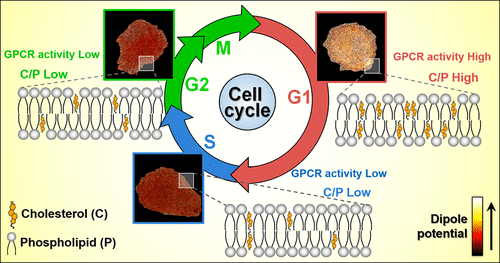当前位置:
X-MOL 学术
›
ACS Chem. Neurosci.
›
论文详情
Our official English website, www.x-mol.net, welcomes your feedback! (Note: you will need to create a separate account there.)
Cell Cycle Dependent Modulation of Membrane Dipole Potential and Neurotransmitter Receptor Activity: Role of Membrane Cholesterol.
ACS Chemical Neuroscience ( IF 5 ) Pub Date : 2020-08-07 , DOI: 10.1021/acschemneuro.0c00499 Parijat Sarkar 1 , Bhagyashree D Rao 1 , Amitabha Chattopadhyay 1
ACS Chemical Neuroscience ( IF 5 ) Pub Date : 2020-08-07 , DOI: 10.1021/acschemneuro.0c00499 Parijat Sarkar 1 , Bhagyashree D Rao 1 , Amitabha Chattopadhyay 1
Affiliation

|
The cell cycle is a sequential multistep process essential for growth and proliferation of cells that make up multicellular organisms. A number of nuclear and cytoplasmic proteins are known to modulate the cell cycle. Yet, the role of lipids, membrane organization, and physical properties in cell cycle progression remains largely elusive. Membrane dipole potential is an important physicochemical property and originates due to the electrostatic potential difference within the membrane because of nonrandom arrangement of amphiphile dipoles and water molecules at the membrane interface. In this work, we explored the modulation of membrane dipole potential in various stages of the cell cycle in CHO-K1 cells. Our results show that membrane dipole potential is highest in the G1 phase relative to S and G2/M phases. This was accompanied by regulation of membrane cholesterol content in the cell cycle. The highest cholesterol content was found in the G1 phase with a considerable reduction in cholesterol in S and G2/M phases. Interestingly, we noted a similarity in the dependence of membrane dipole potential and cholesterol with progress of the cell cycle. In addition, we observed an increase in neutral lipid (which contains esterified cholesterol) content as cells progressed from the G1 to G2/M phase via the S phase of the cell cycle. Importantly, we further observed a cell cycle dependent reduction in ligand binding activity of serotonin1A receptors expressed in CHO-K1 cells. To the best of our knowledge, these results constitute the first report of cell cycle dependent modulation of membrane dipole potential and activity of a neurotransmitter receptor belonging to the G protein-coupled receptor family. We envision that understanding the basis of cell cycle events from a biophysical perspective would result in a deeper appreciation of the cell cycle and its regulation in relation to cellular function.
中文翻译:

细胞周期依赖的膜偶极电位和神经递质受体活性的调节:膜胆固醇的作用。
细胞周期是一个连续的多步过程,对于组成多细胞生物的细胞的生长和增殖至关重要。已知许多核蛋白和细胞质蛋白可调节细胞周期。然而,脂质,膜组织和物理性质在细胞周期进程中的作用仍然难以捉摸。膜偶极电势是一种重要的物理化学性质,它是由于两亲性偶极子和水分子在膜界面处的非随机排列而在膜内产生静电势差引起的。在这项工作中,我们探索了CHO-K1细胞在细胞周期各个阶段中膜偶极子电位的调节。我们的结果表明,相对于S和G2 / M相,G1相的膜偶极电势最高。这伴随着细胞周期中膜胆固醇含量的调节。发现G1期的胆固醇含量最高,而S和G2 / M期的胆固醇却大大降低。有趣的是,我们注意到膜偶极电位和胆固醇对细胞周期进程的依赖性相似。此外,我们观察到随着细胞从G1到G2 / M期通过细胞周期的S期发展,中性脂质(包含酯化胆固醇)的含量增加。重要的是,我们进一步观察到了5-羟色胺配体结合活性的细胞周期依赖性降低 我们注意到膜偶极电位和胆固醇对细胞周期进展的依赖性相似。此外,我们观察到随着细胞从G1到G2 / M期通过细胞周期的S期发展,中性脂质(包含酯化胆固醇)的含量增加。重要的是,我们进一步观察到了5-羟色胺配体结合活性的细胞周期依赖性降低 我们注意到膜偶极电位和胆固醇对细胞周期进展的依赖性相似。此外,我们观察到随着细胞从G1到G2 / M期通过细胞周期的S期发展,中性脂质(包含酯化胆固醇)的含量增加。重要的是,我们进一步观察到了5-羟色胺配体结合活性的细胞周期依赖性降低1A受体在CHO-K1细胞中表达。据我们所知,这些结果首次报道了细胞周期依赖的膜偶极电位调制和属于G蛋白偶联受体家族的神经递质受体的活性。我们设想,从生物物理学的角度了解细胞周期事件的基础将导致对细胞周期及其与细胞功能有关的调控的更深刻的认识。
更新日期:2020-09-16
中文翻译:

细胞周期依赖的膜偶极电位和神经递质受体活性的调节:膜胆固醇的作用。
细胞周期是一个连续的多步过程,对于组成多细胞生物的细胞的生长和增殖至关重要。已知许多核蛋白和细胞质蛋白可调节细胞周期。然而,脂质,膜组织和物理性质在细胞周期进程中的作用仍然难以捉摸。膜偶极电势是一种重要的物理化学性质,它是由于两亲性偶极子和水分子在膜界面处的非随机排列而在膜内产生静电势差引起的。在这项工作中,我们探索了CHO-K1细胞在细胞周期各个阶段中膜偶极子电位的调节。我们的结果表明,相对于S和G2 / M相,G1相的膜偶极电势最高。这伴随着细胞周期中膜胆固醇含量的调节。发现G1期的胆固醇含量最高,而S和G2 / M期的胆固醇却大大降低。有趣的是,我们注意到膜偶极电位和胆固醇对细胞周期进程的依赖性相似。此外,我们观察到随着细胞从G1到G2 / M期通过细胞周期的S期发展,中性脂质(包含酯化胆固醇)的含量增加。重要的是,我们进一步观察到了5-羟色胺配体结合活性的细胞周期依赖性降低 我们注意到膜偶极电位和胆固醇对细胞周期进展的依赖性相似。此外,我们观察到随着细胞从G1到G2 / M期通过细胞周期的S期发展,中性脂质(包含酯化胆固醇)的含量增加。重要的是,我们进一步观察到了5-羟色胺配体结合活性的细胞周期依赖性降低 我们注意到膜偶极电位和胆固醇对细胞周期进展的依赖性相似。此外,我们观察到随着细胞从G1到G2 / M期通过细胞周期的S期发展,中性脂质(包含酯化胆固醇)的含量增加。重要的是,我们进一步观察到了5-羟色胺配体结合活性的细胞周期依赖性降低1A受体在CHO-K1细胞中表达。据我们所知,这些结果首次报道了细胞周期依赖的膜偶极电位调制和属于G蛋白偶联受体家族的神经递质受体的活性。我们设想,从生物物理学的角度了解细胞周期事件的基础将导致对细胞周期及其与细胞功能有关的调控的更深刻的认识。


























 京公网安备 11010802027423号
京公网安备 11010802027423号